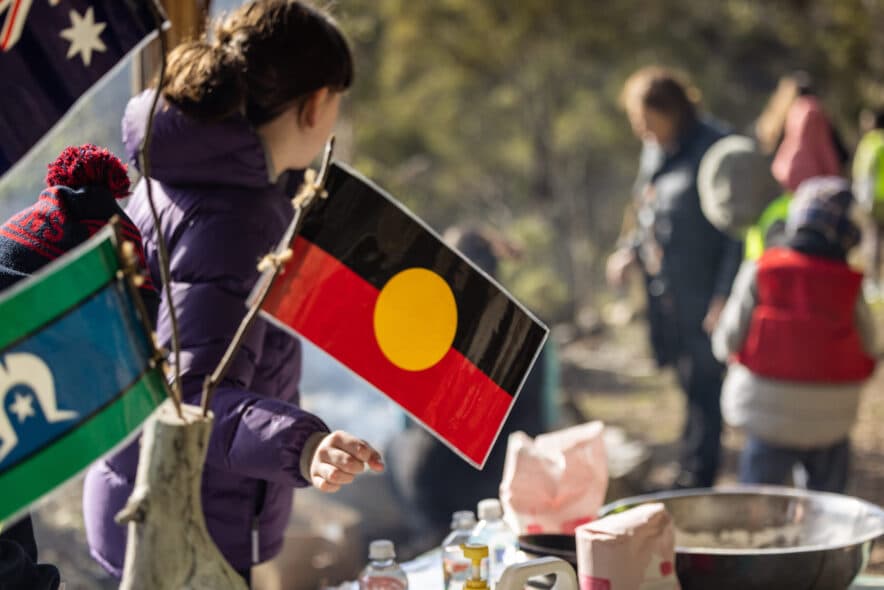Practice
Professional development
Workforce
Be You releases series of resources to support culturally respectful engagement

Freya Lucas
Nov 29, 2023
Save
Be You, the national mental health and wellbeing in education initiative, has developed a suite of resources to help educators improve cultural responsiveness in early learning services and schools.
The resources invite genuine connection with Aboriginal and Torres Strait Islander children, young people, families and communities by supporting educators to create inclusive spaces where cultural diversity is celebrated.Co-designed with a panel of First Nations Peoples, the resources aim to be an important step towards creating safe, welcoming and culturally responsive early learning services and schools.
Nina Ross, Senior Officer Professional Learning Curriculum at Narragunnawali, Reconciliation in Education, was one of the panelists, and says the resources “are very much needed”.
“This was a special thing to be a part of, as an Aboriginal person,” she said, also stating that the resources are a great tool to support non-Aboriginal or non- Indigenous people.
“We are all connected, and we can be a much richer, healthier and sustainable population when we respectfully engage with First Nations brothers and sisters,” she said.
Working on the project panel alongside Be You and First Nations Peoples was a rewarding experience, she continued, particularly when listening to their shared stories about children and young people.
“I felt heard, I felt valued, and I felt useful to help create resources that will support many, many educators,” she said.
“With updates to the Early Years Learning Framework, new version of the National Curriculum and the current social and political change happening right now in Australia, educators need this resource to help with conversations and relationship building.”
“There are a lot of children and young people who will benefit from this in their education setting and I feel really honoured to have been a part of that.”
Juanita Wilson, Inclusion and Equity Advisor First Nations Communities at Beyond Blue, was part of the working group discussions with the First Nations Panel.
“Now, and always, it is essential for guided self-reflection that we engage with First Nations communities in a respectful and meaningful way,” she said.
“We know that fostering a warm, safe and inclusive setting that acknowledges First Nations Peoples benefits everyone’s wellbeing.”
The resources, the full list of which appears below, can be used whether or not there are children or young people who identify as First Nations:
- Reflect, respect, respond – Protocols for culturally respectful engagement with First Nations communities: developed with First Nations educators, this guide provides practical information, reflections, case studies and suggested actions to support educators in creating welcoming, culturally responsive learning environments.
- Creating a stakeholder list – An introduction to why and how to create a list of key Aboriginal and Torres Strait Islander community members and organisations in your area. Creating this list will enable you to meaningfully engage with community members and embed culturally responsive practices in your learning community.
- Cultural responsiveness in learning communities – A focus on Aboriginal and Torres Strait Islander Peoples: exploring ways to start and develop an understanding and respect towards Aboriginal and Torres Strait Islander ways of knowing and being.
- Organisations for engaging with Aboriginal and Torres Strait Islander Peoples and cultures – A list of organisations providing advocacy, research and learning resources to build relationships that value Aboriginal and Torres Strait Islander Peoples, histories and cultures.
- Cultural actions catalogue – A collection of information and suggested actions to help educators create inclusive and respectful learning environments that embrace the histories and cultures of their communities. This place-based resource was co-designed with Aboriginal Elders, educators, health services and community members across the Kimberley and Pilbara regions.
“We need to be doing this work together to foster mentally healthy communities,” Ms Wilson said.
“A quote comes to mind here when working with children and community ‘do it for me and I learn, but do it with me and I thrive’.”
“When we do this together, we can thrive and enjoy our best possible mental health and wellbeing.”
Access the resources here.
Don’t miss a thing
Related Articles



















